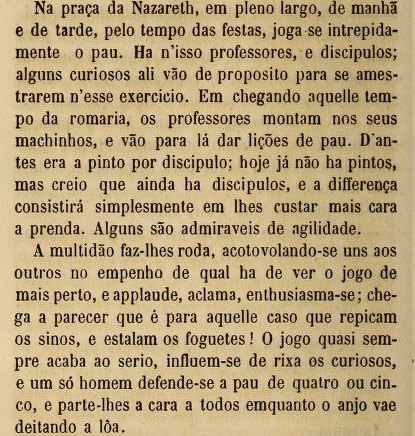Na praça da Nazaré, em pleno largo, de manhã e de tarde, pelo tempo das festas, joga se intrepidamente o pau. Há ali professores e discípulos: alguns curiosos ali vão de propósito para se amestrarem neste exercício.
Em chegando aquele tempo da romaria, os professores montam nos seus machinhos, e vão para lá dar lições de pau. Dantes era a pinto por discípulo; hoje já não há pintos, mas creio que ainda há discípulos, e a diferença consistirá simplesmente em lhes custar mais cara a prenda. Alguns são admiráveis de agilidade. A multidão faz-lhes roto, acotovelando-se uns aos outros no empenho de qual há de ver o jogo de mais perto, e aplaude, aclama, entusiasma-se; chega a parecer que é para aquele caso que repicam os sinos, e estalam os foguetes! O jogo quase sempre acaba ao serio, influem-se de rixa os curiosos, e um só homem defende-se a pau de quatro ou cinco, e parte-lhes a cara a todos enquanto o anjo vai deitando a lôa….
“Á lareira – O homem das forças” – Júlio César Machado, 1872
EN:
“At the Nazaré’s Square, in the morning and in the afternoon by the time of the festivities, there happens be some intrepid staff fencing. The are teachers and students there, and some others interested in mastering themselves on this exercise. At this time of pilgrimage, the teachers ride their horses and go there to give staff fencing lessons. They used to cost a “Pinto”(old coin). Today there are no “Pinto” coins anymore, but there are still students. The difference is that the “pay” now is more expensive. Some of them are admirable in agility.
The Crowd surrounds them, to see the fencing from closer, applaud and exclaims, it even seems that the bells and the fireworks from the festivities are there for this occasion. The fencing almost always ends with severity, the most invested in, pressure it, and a man alone fences them off with a staff, against four or five, and breaks their faces in blink of a eye.”

